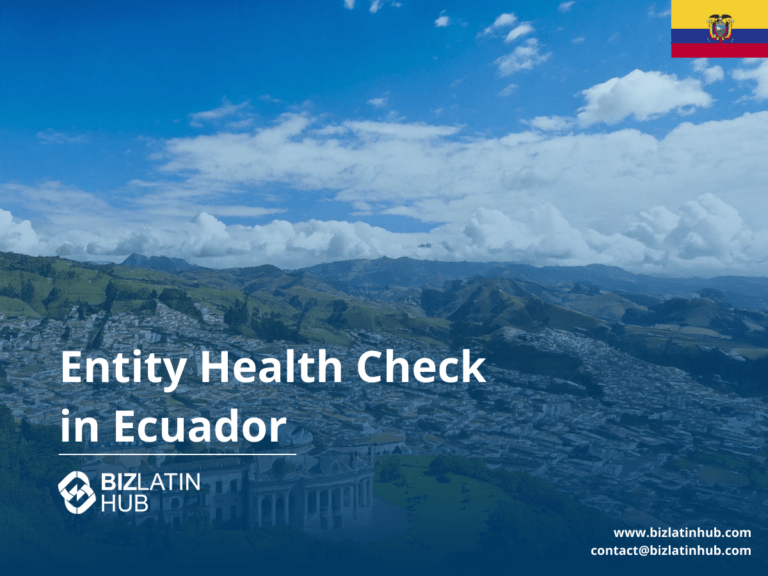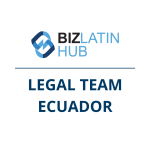An entity health check reviews your company’s compliance with Ecuador’s laws. This review covers all legal requirements for businesses already operating in, or considering company formation in Ecuador. Companies need regular health checks to avoid penalties and maintain legal status. This guide explains the purpose of a proactive compliance audit and details the primary areas of review necessary to ensure a company is fully compliant with Ecuadorian regulations.
Key Takeaways: Entity Health Check in Ecuador
| What are the key areas reviewed for an Ecuadorian company? | Corporate structure, tax obligations, employment law, data protection (LOPDP), licenses and permits |
| What is a corporate entity health check? | A health check ensures all annual corporate reports have been filed. |
| What does a tax check do? | It verifies compliance with the Superintendence of Companies, the SRI, and IESS. |
| Why is a health check vital for risk management? | It allows due diligence for acquisitions and also raises issues before the authorities get involved, which could lead to fines or cessation of activities. |
The Importance of a Corporate Health Check in Ecuador
An entity health check is a comprehensive diagnostic of a company’s legal and financial records. Its objective is to detect any non-compliance issues, such as unfiled reports or unpaid social security contributions, and provide a roadmap for correction before they lead to government sanctions.
An entity health check examines your company’s legal compliance in Ecuador. The process reviews corporate documents, tax filings, employment records, and regulatory permits. Companies use health checks to find compliance gaps before authorities discover them.
Entity health checks differ from transaction due diligence. Health checks monitor ongoing compliance for all businesses. Due diligence focuses on specific events like mergers or acquisitions. Both processes help companies meet legal requirements in Ecuador.
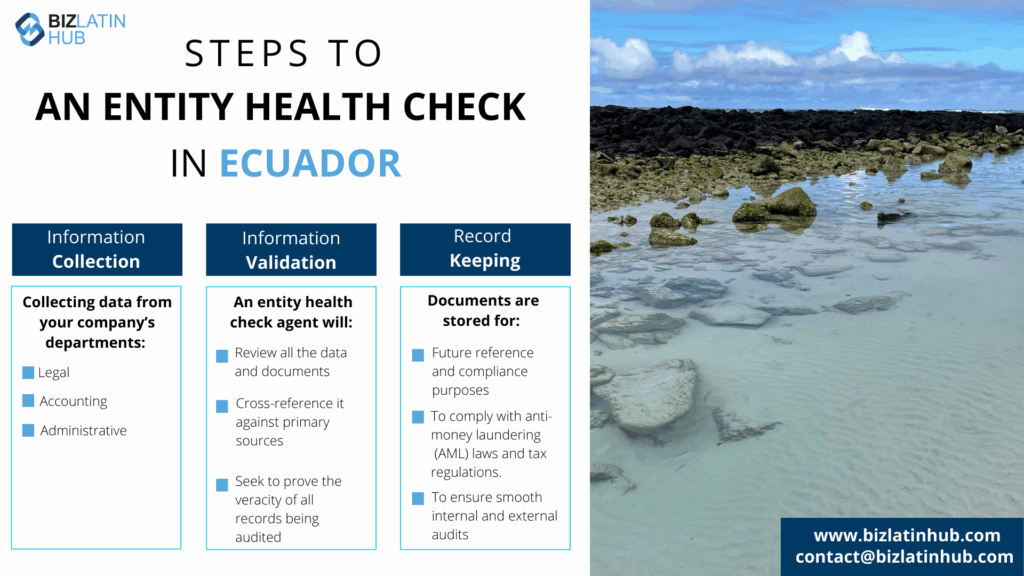
Key Areas Reviewed in an Ecuadorian Entity Health Check
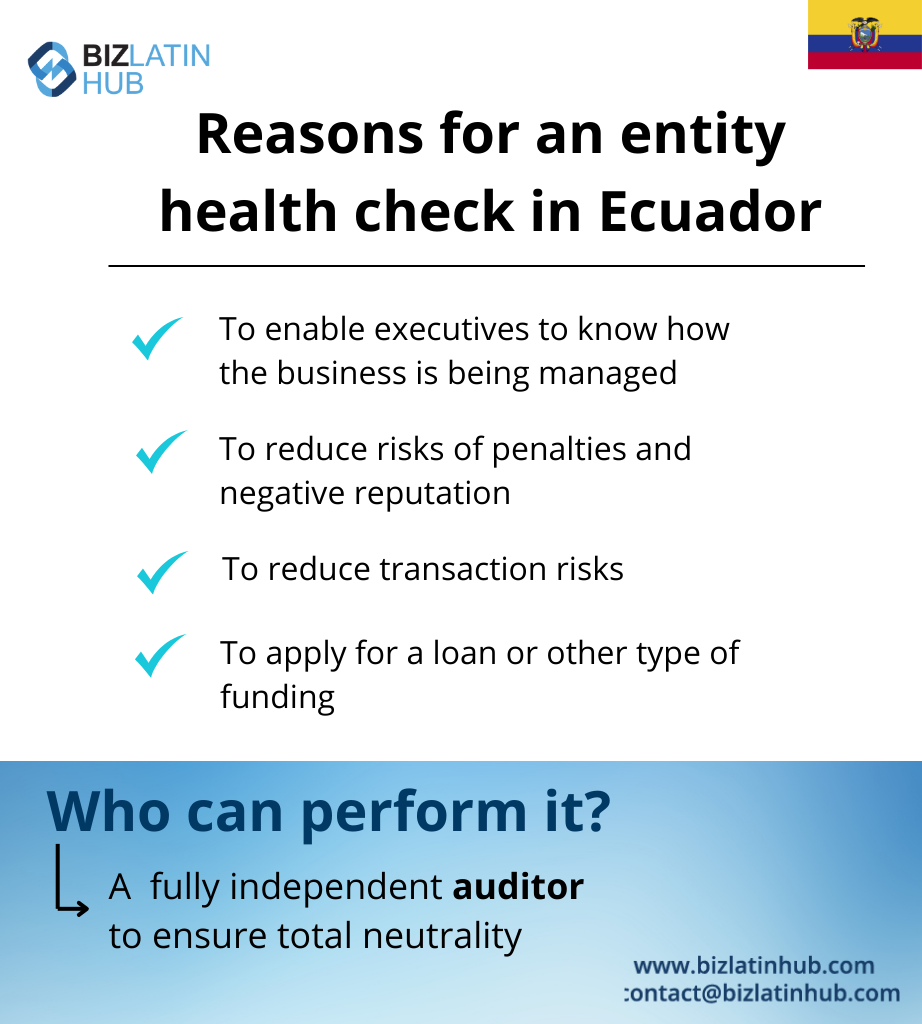
Expert Tip: Verifying Annual Filings with the Superintendence of Companies
From our experience, the most common compliance gaps in Ecuador relate to the numerous annual filings required by the Superintendence of Companies. It is not just one report; companies must file their annual financial statements, a legal representative’s report, information on foreign shareholders, and the Ultimate Beneficial Owner (UBO) declaration, among others.
Each has a specific deadline. A health check must meticulously cross-reference the company’s records against the Superintendence’s online portal to ensure every single one of these reports was filed correctly and on time, as missing even one can compromise the company’s good standing.
1. Corporate Compliance with the Superintendence of Companies
Every company in Ecuador needs a registered office address. This address receives all government correspondence. Companies must update this address when they move locations.
Companies must maintain accurate shareholder records. Board appointments require proper documentation. Legal representatives need valid powers of attorney. These documents prove your company’s legal structure to authorities.
This audit verifies that all annual reports, including financial statements and UBO declarations, have been correctly submitted and that the company’s information on file is accurate.
2. Tax Compliance with the SRI
Ecuador requires companies to file taxes on strict schedules. Your RUC tax identification connects to all tax obligations. Companies file VAT returns monthly and income tax returns annually. Municipal taxes vary by city and business type.
Companies must hold shareholder meetings by March 31 each year. Shareholders approve financial statements at these meetings. Companies then submit required documents to authorities by April 30.
This involves a review of all monthly and annual tax filings to ensure they were submitted on time and that all tax obligations have been paid.
Annual Filing Requirements
| Deadline | Required Action |
|---|---|
| March 31 | Hold shareholder meeting |
| April 30 | Submit financial documents |
Companies with assets over USD 1,000,000 must hire external auditors. Foreign branches need auditors if assets exceed USD 100,000. Oil, gas, and banking companies face additional audit requirements.
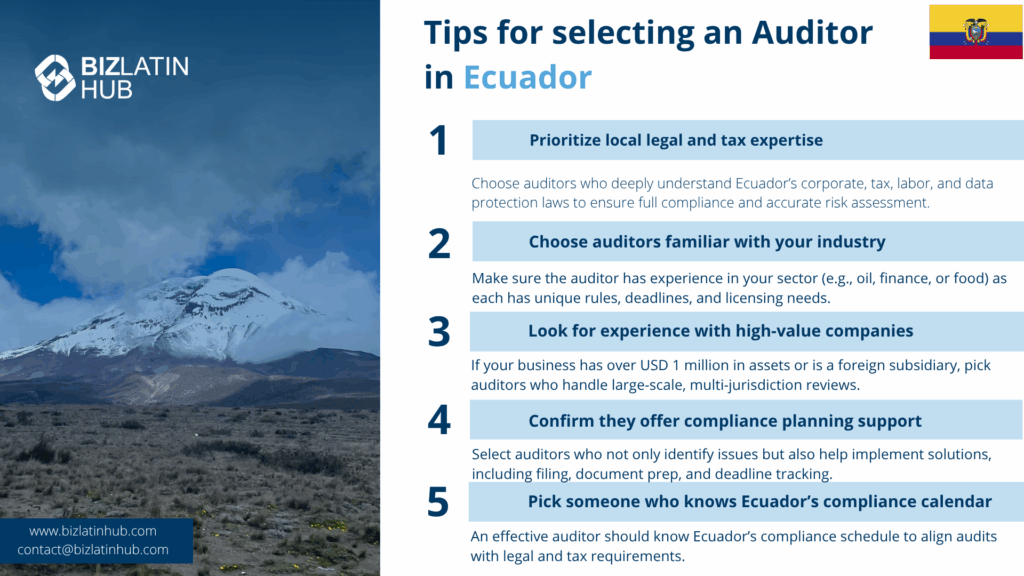
3. Labor and Social Security Compliance with IESS
All employees must register with IESS social security before starting work. Employment contracts must include specific clauses required by law. Companies distribute 15% of annual profits to employees through mandatory profit sharing.
Foreign employees need proper work visas. Companies sponsor these visas and maintain immigration compliance. Workplace safety regulations require regular inspections and documentation.
This check verifies that all employees are correctly registered with the Ministry of Labor and IESS, and that all monthly social security contributions have been paid in full.
4. Financial and Accounting Records
This review ensures the company’s accounting books are properly maintained in Spanish and according to local standards, and that they provide adequate support for the filed financial statements.
The Health Check Process
Week 1: Document Collection
The health check starts with gathering corporate documents. Reviewers examine bylaws, shareholder agreements, and board resolutions. Financial statements show tax compliance history. Permit records confirm regulatory approvals.
Week 2: Gap Identification
Reviewers compare your documents against legal requirements. Missing filings become immediately apparent. Expired permits need renewal. Outdated corporate records require updates.
Week 3: Action Planning
The review team creates a fix-it list with specific deadlines. Each item shows who must complete it and when. Cost estimates help budget for compliance improvements. The plan prioritizes high-risk items first.
Week 4: Implementation Support
Companies receive help preparing required documents. The team assists with government filings. Progress reports track completion of each requirement. Ongoing support continues until full compliance.
Digital Requirements for Modern Businesses
All companies must use electronic invoicing systems. These systems connect directly to tax authorities. Digital signatures replace physical signatures for official documents. Companies processing data need cybersecurity measures.
E-commerce businesses follow consumer protection rules. Websites must show clear prices and return policies. Payment systems need security certifications. Customer data requires special protection.
International Transaction Rules
Transactions over USD 5,000 require Central Bank reports. Companies document transfer pricing for related-party deals. Anti-money laundering rules apply to all businesses. Foreign exchange regulations affect international payments.
Industry-Specific Requirements
Financial services companies follow strict anti-money laundering rules. Oil and gas operations need environmental impact assessments. Technology firms protect intellectual property and user data. Manufacturers document import procedures and quality standards. Service providers obtain professional licenses.
Food and pharmaceutical companies need ARCSA registrations. Product labels must meet INEN standards. Advertising follows strict content rules. These sectors require specialized compliance knowledge.
Common Compliance Mistakes
Many companies miss the March 31 shareholder meeting deadline. Starting preparations in February prevents this problem. Document gathering for April filings should begin in January.
Companies often forget to update their registered address after moving. This causes missed government notices. The 15-day data request response requirement catches many companies unprepared.
Foreign companies sometimes apply compliance rules from other countries. Ecuador has unique requirements that differ from neighbors like Colombia or Chile. Local knowledge prevents these errors.
Building Your Compliance System
Successful compliance requires regular monitoring. Companies assign specific people to track deadlines. Document management systems organize important records. Regular reviews catch problems early.
Combining annual compliance tasks saves money. Companies can reduce professional fees by coordinating health checks with regular filings. This approach eliminates duplicate work.
Frequently Asked Questions: Entity Health Check in Ecuador
How often should we conduct an entity health check in Ecuador?
Annual comprehensive reviews are best practice, with quarterly compliance checks advisable for high-risk sectors such as oil, gas and banking, or for companies holding assets above USD $1,000,000.
What is the Superintendence of Companies?
The Superintendence of Companies is the government body in Ecuador that supervises and controls all corporate entities. It is the authority to which companies must submit their annual financial statements and other corporate reports.
What is the SRI?
The SRI (Servicio de Rentas Internas) is Ecuador’s Internal Revenue Service. It is responsible for all tax matters. A health check verifies that all VAT and income tax filings with the SRI are current.
What is IESS?
The IESS (Instituto Ecuatoriano de Seguridad Social) is the Ecuadorian Social Security Institute. A health check confirms that the employer has made all mandatory monthly social security contributions for its employees to the IESS.
What happens if a company is not in good standing?
A company that is not in good standing with the Superintendence of Companies cannot obtain a Certificate of Good Standing (Certificado de Cumplimiento de Obligaciones). This certificate is required for many essential business activities, including opening bank accounts, participating in public bids, and selling the company.
Biz Latin Hub can help you organize an entity health check in Ecuador
At Biz Latin Hub, our multilingual team of company formation specialists has extensive experience in supporting foreign executives when starting a business in Latin America. We offer a complete set of services for your business needs, such as legal, accounting, and recruitment support.
You can rely on us as your main contact for entering and doing business in any of the 18 markets in Latin America and the Caribbean where we operate.
Contact us now for personalized assistance or a free quote on company formation in Latin America.
Learn more about our team and expert authors.

